Marketing Management: Online Marketing Analysis and Ethics
VerifiedAdded on 2022/08/14
|10
|2894
|15
Report
AI Summary
This report provides a comprehensive analysis of online marketing, beginning with an introduction to the practice and its significance in the digital age. It delves into the evolution of online marketing, tracing the shifts from Web 1.0 to Web 3.0, and highlights the evolution of various marketing strategies. The report then explores the crucial role of ethics and corporate social responsibility in online marketing, emphasizing privacy concerns, transparency, and the potential for unethical practices. Social criticisms of online marketing are also examined, focusing on issues such as pricing, deceptive practices, and the impact of high-pressure selling tactics. The analysis includes case studies of companies like Nestle and Amazon, illustrating both ethical and unethical marketing approaches. The report concludes by summarizing the key findings and emphasizing the need for ethical considerations in online marketing to ensure sustainable business growth and positive societal impact.
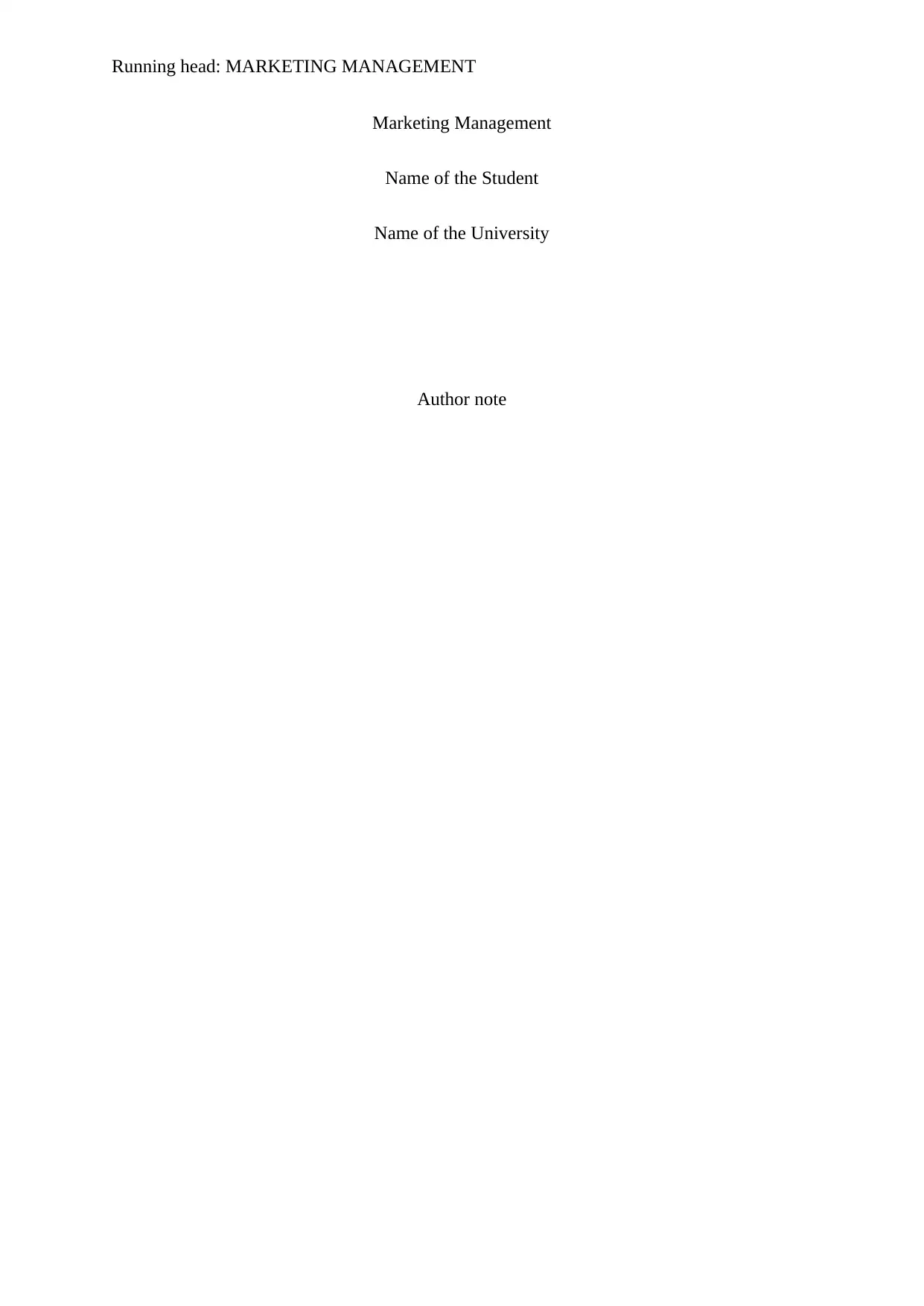
Running head: MARKETING MANAGEMENT
Marketing Management
Name of the Student
Name of the University
Author note
Marketing Management
Name of the Student
Name of the University
Author note
Paraphrase This Document
Need a fresh take? Get an instant paraphrase of this document with our AI Paraphraser
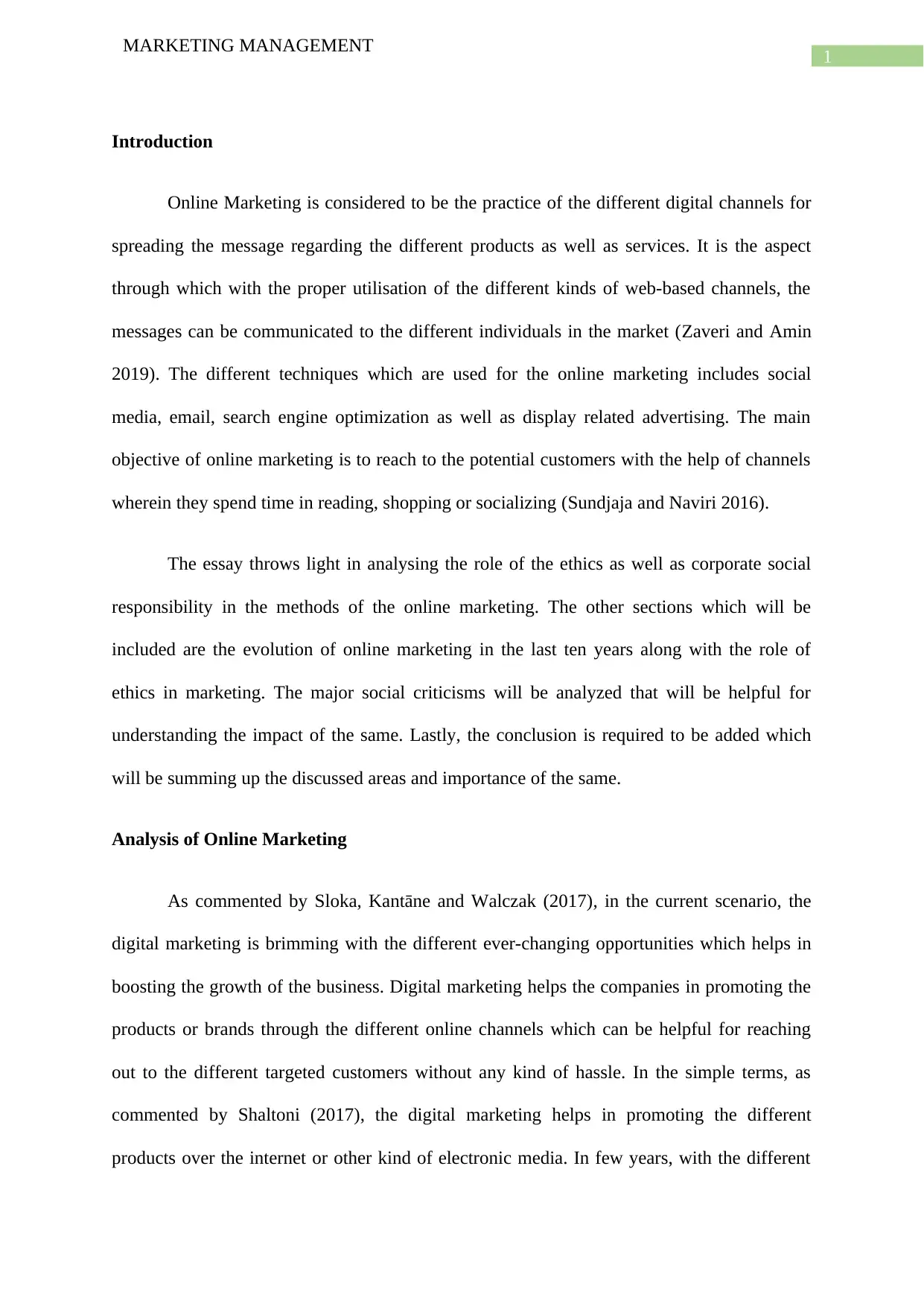
1
MARKETING MANAGEMENT
Introduction
Online Marketing is considered to be the practice of the different digital channels for
spreading the message regarding the different products as well as services. It is the aspect
through which with the proper utilisation of the different kinds of web-based channels, the
messages can be communicated to the different individuals in the market (Zaveri and Amin
2019). The different techniques which are used for the online marketing includes social
media, email, search engine optimization as well as display related advertising. The main
objective of online marketing is to reach to the potential customers with the help of channels
wherein they spend time in reading, shopping or socializing (Sundjaja and Naviri 2016).
The essay throws light in analysing the role of the ethics as well as corporate social
responsibility in the methods of the online marketing. The other sections which will be
included are the evolution of online marketing in the last ten years along with the role of
ethics in marketing. The major social criticisms will be analyzed that will be helpful for
understanding the impact of the same. Lastly, the conclusion is required to be added which
will be summing up the discussed areas and importance of the same.
Analysis of Online Marketing
As commented by Sloka, Kantāne and Walczak (2017), in the current scenario, the
digital marketing is brimming with the different ever-changing opportunities which helps in
boosting the growth of the business. Digital marketing helps the companies in promoting the
products or brands through the different online channels which can be helpful for reaching
out to the different targeted customers without any kind of hassle. In the simple terms, as
commented by Shaltoni (2017), the digital marketing helps in promoting the different
products over the internet or other kind of electronic media. In few years, with the different
MARKETING MANAGEMENT
Introduction
Online Marketing is considered to be the practice of the different digital channels for
spreading the message regarding the different products as well as services. It is the aspect
through which with the proper utilisation of the different kinds of web-based channels, the
messages can be communicated to the different individuals in the market (Zaveri and Amin
2019). The different techniques which are used for the online marketing includes social
media, email, search engine optimization as well as display related advertising. The main
objective of online marketing is to reach to the potential customers with the help of channels
wherein they spend time in reading, shopping or socializing (Sundjaja and Naviri 2016).
The essay throws light in analysing the role of the ethics as well as corporate social
responsibility in the methods of the online marketing. The other sections which will be
included are the evolution of online marketing in the last ten years along with the role of
ethics in marketing. The major social criticisms will be analyzed that will be helpful for
understanding the impact of the same. Lastly, the conclusion is required to be added which
will be summing up the discussed areas and importance of the same.
Analysis of Online Marketing
As commented by Sloka, Kantāne and Walczak (2017), in the current scenario, the
digital marketing is brimming with the different ever-changing opportunities which helps in
boosting the growth of the business. Digital marketing helps the companies in promoting the
products or brands through the different online channels which can be helpful for reaching
out to the different targeted customers without any kind of hassle. In the simple terms, as
commented by Shaltoni (2017), the digital marketing helps in promoting the different
products over the internet or other kind of electronic media. In few years, with the different
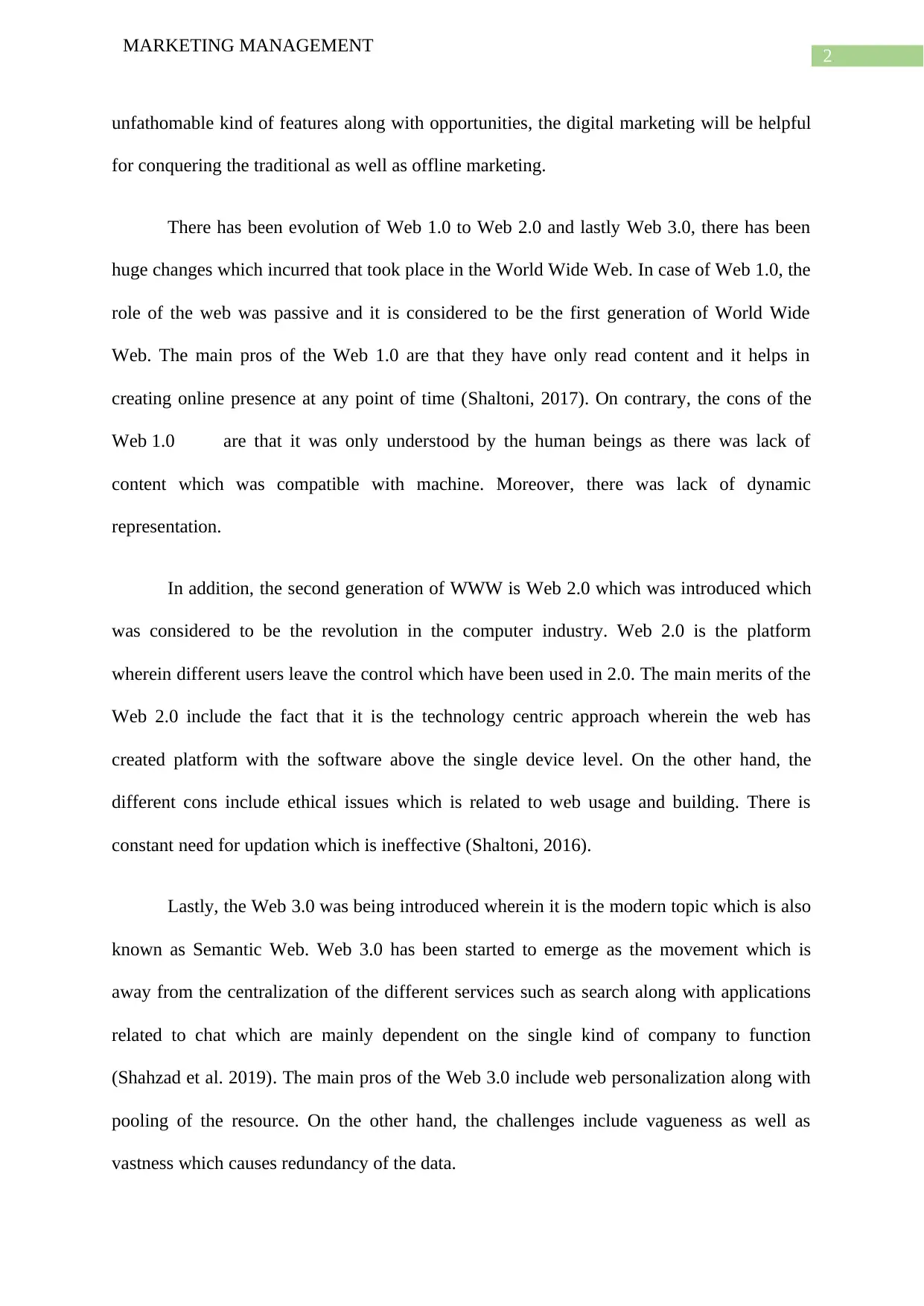
2
MARKETING MANAGEMENT
unfathomable kind of features along with opportunities, the digital marketing will be helpful
for conquering the traditional as well as offline marketing.
There has been evolution of Web 1.0 to Web 2.0 and lastly Web 3.0, there has been
huge changes which incurred that took place in the World Wide Web. In case of Web 1.0, the
role of the web was passive and it is considered to be the first generation of World Wide
Web. The main pros of the Web 1.0 are that they have only read content and it helps in
creating online presence at any point of time (Shaltoni, 2017). On contrary, the cons of the
Web 1.0 are that it was only understood by the human beings as there was lack of
content which was compatible with machine. Moreover, there was lack of dynamic
representation.
In addition, the second generation of WWW is Web 2.0 which was introduced which
was considered to be the revolution in the computer industry. Web 2.0 is the platform
wherein different users leave the control which have been used in 2.0. The main merits of the
Web 2.0 include the fact that it is the technology centric approach wherein the web has
created platform with the software above the single device level. On the other hand, the
different cons include ethical issues which is related to web usage and building. There is
constant need for updation which is ineffective (Shaltoni, 2016).
Lastly, the Web 3.0 was being introduced wherein it is the modern topic which is also
known as Semantic Web. Web 3.0 has been started to emerge as the movement which is
away from the centralization of the different services such as search along with applications
related to chat which are mainly dependent on the single kind of company to function
(Shahzad et al. 2019). The main pros of the Web 3.0 include web personalization along with
pooling of the resource. On the other hand, the challenges include vagueness as well as
vastness which causes redundancy of the data.
MARKETING MANAGEMENT
unfathomable kind of features along with opportunities, the digital marketing will be helpful
for conquering the traditional as well as offline marketing.
There has been evolution of Web 1.0 to Web 2.0 and lastly Web 3.0, there has been
huge changes which incurred that took place in the World Wide Web. In case of Web 1.0, the
role of the web was passive and it is considered to be the first generation of World Wide
Web. The main pros of the Web 1.0 are that they have only read content and it helps in
creating online presence at any point of time (Shaltoni, 2017). On contrary, the cons of the
Web 1.0 are that it was only understood by the human beings as there was lack of
content which was compatible with machine. Moreover, there was lack of dynamic
representation.
In addition, the second generation of WWW is Web 2.0 which was introduced which
was considered to be the revolution in the computer industry. Web 2.0 is the platform
wherein different users leave the control which have been used in 2.0. The main merits of the
Web 2.0 include the fact that it is the technology centric approach wherein the web has
created platform with the software above the single device level. On the other hand, the
different cons include ethical issues which is related to web usage and building. There is
constant need for updation which is ineffective (Shaltoni, 2016).
Lastly, the Web 3.0 was being introduced wherein it is the modern topic which is also
known as Semantic Web. Web 3.0 has been started to emerge as the movement which is
away from the centralization of the different services such as search along with applications
related to chat which are mainly dependent on the single kind of company to function
(Shahzad et al. 2019). The main pros of the Web 3.0 include web personalization along with
pooling of the resource. On the other hand, the challenges include vagueness as well as
vastness which causes redundancy of the data.
⊘ This is a preview!⊘
Do you want full access?
Subscribe today to unlock all pages.

Trusted by 1+ million students worldwide
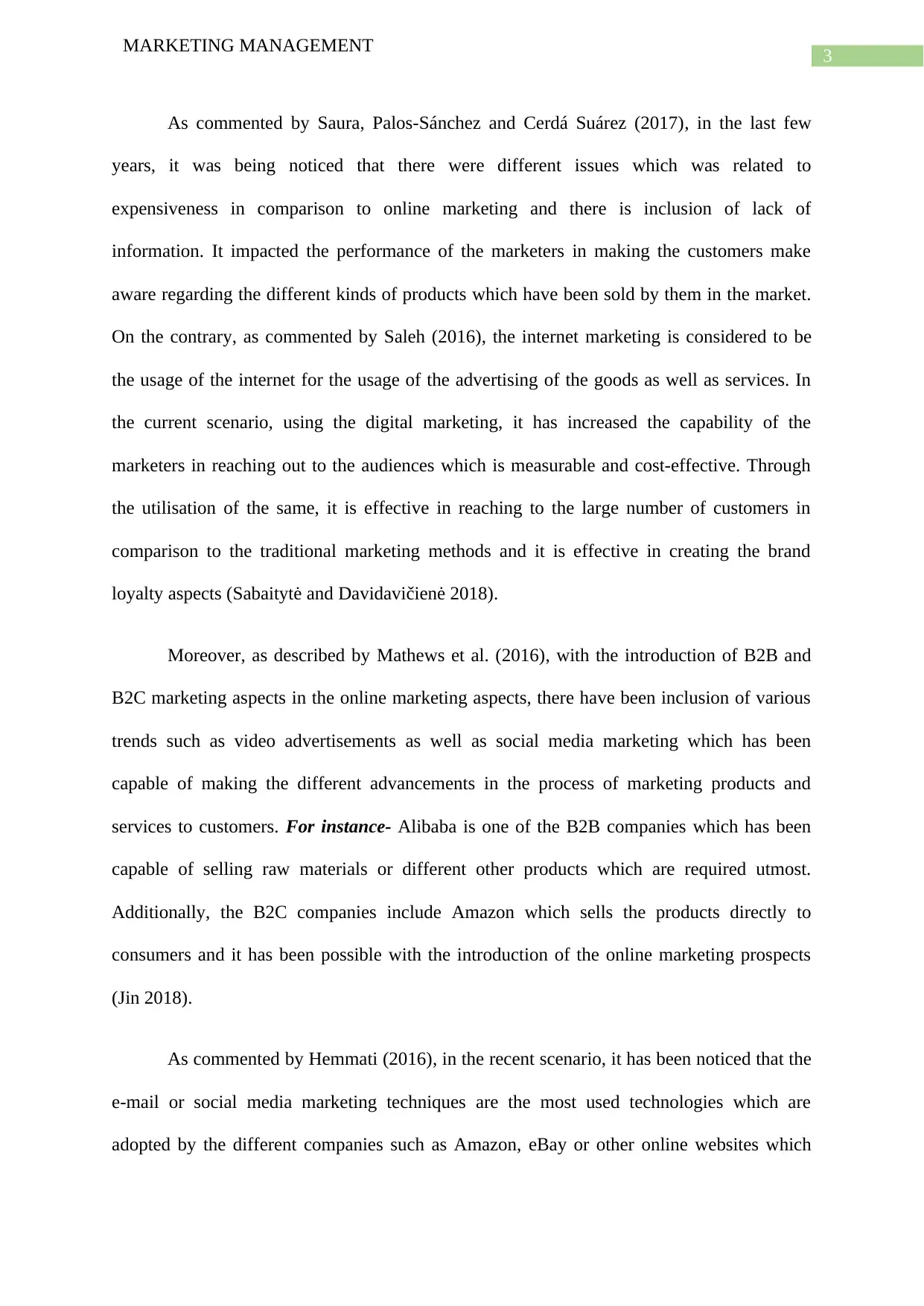
3
MARKETING MANAGEMENT
As commented by Saura, Palos-Sánchez and Cerdá Suárez (2017), in the last few
years, it was being noticed that there were different issues which was related to
expensiveness in comparison to online marketing and there is inclusion of lack of
information. It impacted the performance of the marketers in making the customers make
aware regarding the different kinds of products which have been sold by them in the market.
On the contrary, as commented by Saleh (2016), the internet marketing is considered to be
the usage of the internet for the usage of the advertising of the goods as well as services. In
the current scenario, using the digital marketing, it has increased the capability of the
marketers in reaching out to the audiences which is measurable and cost-effective. Through
the utilisation of the same, it is effective in reaching to the large number of customers in
comparison to the traditional marketing methods and it is effective in creating the brand
loyalty aspects (Sabaitytė and Davidavičienė 2018).
Moreover, as described by Mathews et al. (2016), with the introduction of B2B and
B2C marketing aspects in the online marketing aspects, there have been inclusion of various
trends such as video advertisements as well as social media marketing which has been
capable of making the different advancements in the process of marketing products and
services to customers. For instance- Alibaba is one of the B2B companies which has been
capable of selling raw materials or different other products which are required utmost.
Additionally, the B2C companies include Amazon which sells the products directly to
consumers and it has been possible with the introduction of the online marketing prospects
(Jin 2018).
As commented by Hemmati (2016), in the recent scenario, it has been noticed that the
e-mail or social media marketing techniques are the most used technologies which are
adopted by the different companies such as Amazon, eBay or other online websites which
MARKETING MANAGEMENT
As commented by Saura, Palos-Sánchez and Cerdá Suárez (2017), in the last few
years, it was being noticed that there were different issues which was related to
expensiveness in comparison to online marketing and there is inclusion of lack of
information. It impacted the performance of the marketers in making the customers make
aware regarding the different kinds of products which have been sold by them in the market.
On the contrary, as commented by Saleh (2016), the internet marketing is considered to be
the usage of the internet for the usage of the advertising of the goods as well as services. In
the current scenario, using the digital marketing, it has increased the capability of the
marketers in reaching out to the audiences which is measurable and cost-effective. Through
the utilisation of the same, it is effective in reaching to the large number of customers in
comparison to the traditional marketing methods and it is effective in creating the brand
loyalty aspects (Sabaitytė and Davidavičienė 2018).
Moreover, as described by Mathews et al. (2016), with the introduction of B2B and
B2C marketing aspects in the online marketing aspects, there have been inclusion of various
trends such as video advertisements as well as social media marketing which has been
capable of making the different advancements in the process of marketing products and
services to customers. For instance- Alibaba is one of the B2B companies which has been
capable of selling raw materials or different other products which are required utmost.
Additionally, the B2C companies include Amazon which sells the products directly to
consumers and it has been possible with the introduction of the online marketing prospects
(Jin 2018).
As commented by Hemmati (2016), in the recent scenario, it has been noticed that the
e-mail or social media marketing techniques are the most used technologies which are
adopted by the different companies such as Amazon, eBay or other online websites which
Paraphrase This Document
Need a fresh take? Get an instant paraphrase of this document with our AI Paraphraser
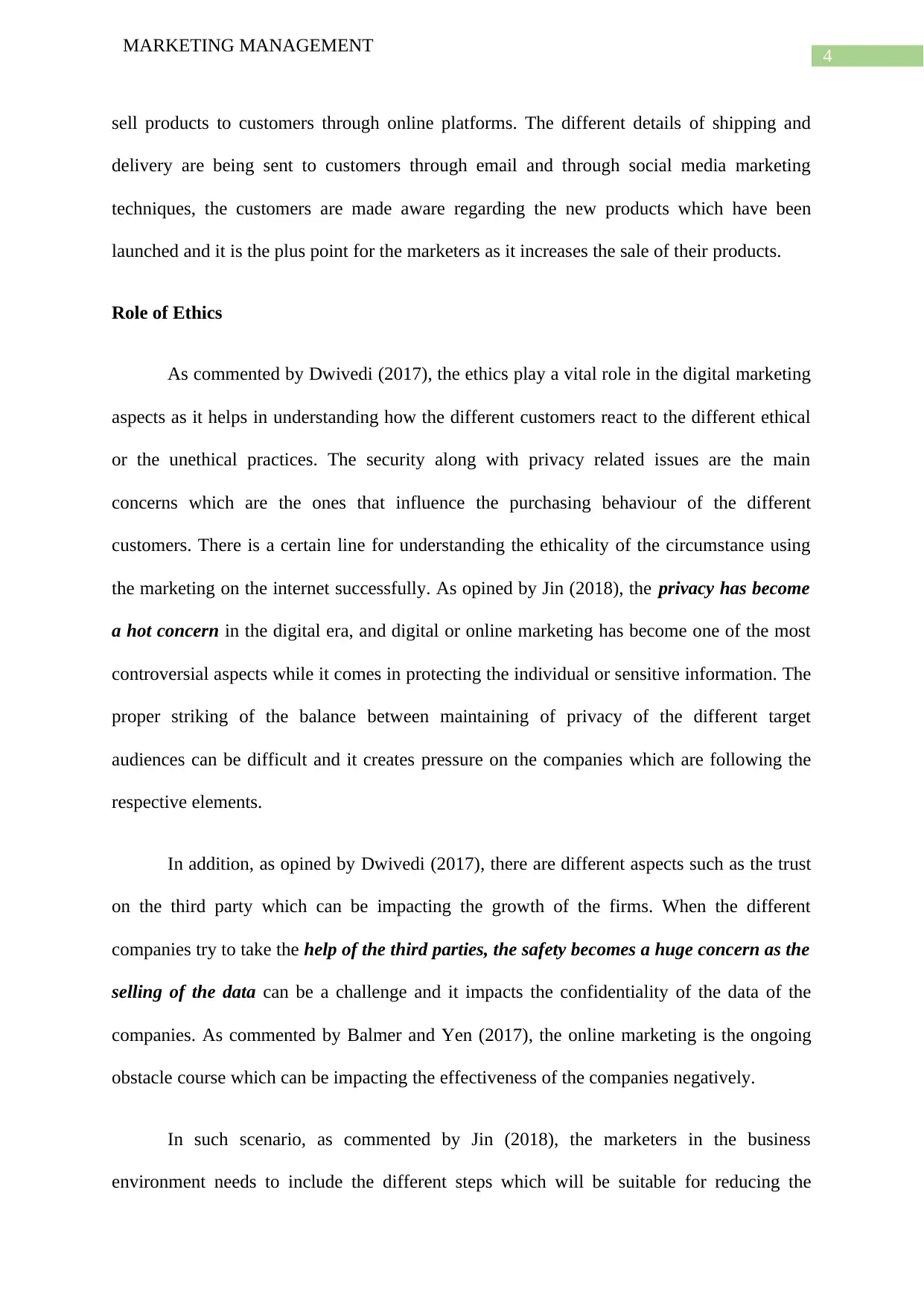
4
MARKETING MANAGEMENT
sell products to customers through online platforms. The different details of shipping and
delivery are being sent to customers through email and through social media marketing
techniques, the customers are made aware regarding the new products which have been
launched and it is the plus point for the marketers as it increases the sale of their products.
Role of Ethics
As commented by Dwivedi (2017), the ethics play a vital role in the digital marketing
aspects as it helps in understanding how the different customers react to the different ethical
or the unethical practices. The security along with privacy related issues are the main
concerns which are the ones that influence the purchasing behaviour of the different
customers. There is a certain line for understanding the ethicality of the circumstance using
the marketing on the internet successfully. As opined by Jin (2018), the privacy has become
a hot concern in the digital era, and digital or online marketing has become one of the most
controversial aspects while it comes in protecting the individual or sensitive information. The
proper striking of the balance between maintaining of privacy of the different target
audiences can be difficult and it creates pressure on the companies which are following the
respective elements.
In addition, as opined by Dwivedi (2017), there are different aspects such as the trust
on the third party which can be impacting the growth of the firms. When the different
companies try to take the help of the third parties, the safety becomes a huge concern as the
selling of the data can be a challenge and it impacts the confidentiality of the data of the
companies. As commented by Balmer and Yen (2017), the online marketing is the ongoing
obstacle course which can be impacting the effectiveness of the companies negatively.
In such scenario, as commented by Jin (2018), the marketers in the business
environment needs to include the different steps which will be suitable for reducing the
MARKETING MANAGEMENT
sell products to customers through online platforms. The different details of shipping and
delivery are being sent to customers through email and through social media marketing
techniques, the customers are made aware regarding the new products which have been
launched and it is the plus point for the marketers as it increases the sale of their products.
Role of Ethics
As commented by Dwivedi (2017), the ethics play a vital role in the digital marketing
aspects as it helps in understanding how the different customers react to the different ethical
or the unethical practices. The security along with privacy related issues are the main
concerns which are the ones that influence the purchasing behaviour of the different
customers. There is a certain line for understanding the ethicality of the circumstance using
the marketing on the internet successfully. As opined by Jin (2018), the privacy has become
a hot concern in the digital era, and digital or online marketing has become one of the most
controversial aspects while it comes in protecting the individual or sensitive information. The
proper striking of the balance between maintaining of privacy of the different target
audiences can be difficult and it creates pressure on the companies which are following the
respective elements.
In addition, as opined by Dwivedi (2017), there are different aspects such as the trust
on the third party which can be impacting the growth of the firms. When the different
companies try to take the help of the third parties, the safety becomes a huge concern as the
selling of the data can be a challenge and it impacts the confidentiality of the data of the
companies. As commented by Balmer and Yen (2017), the online marketing is the ongoing
obstacle course which can be impacting the effectiveness of the companies negatively.
In such scenario, as commented by Jin (2018), the marketers in the business
environment needs to include the different steps which will be suitable for reducing the
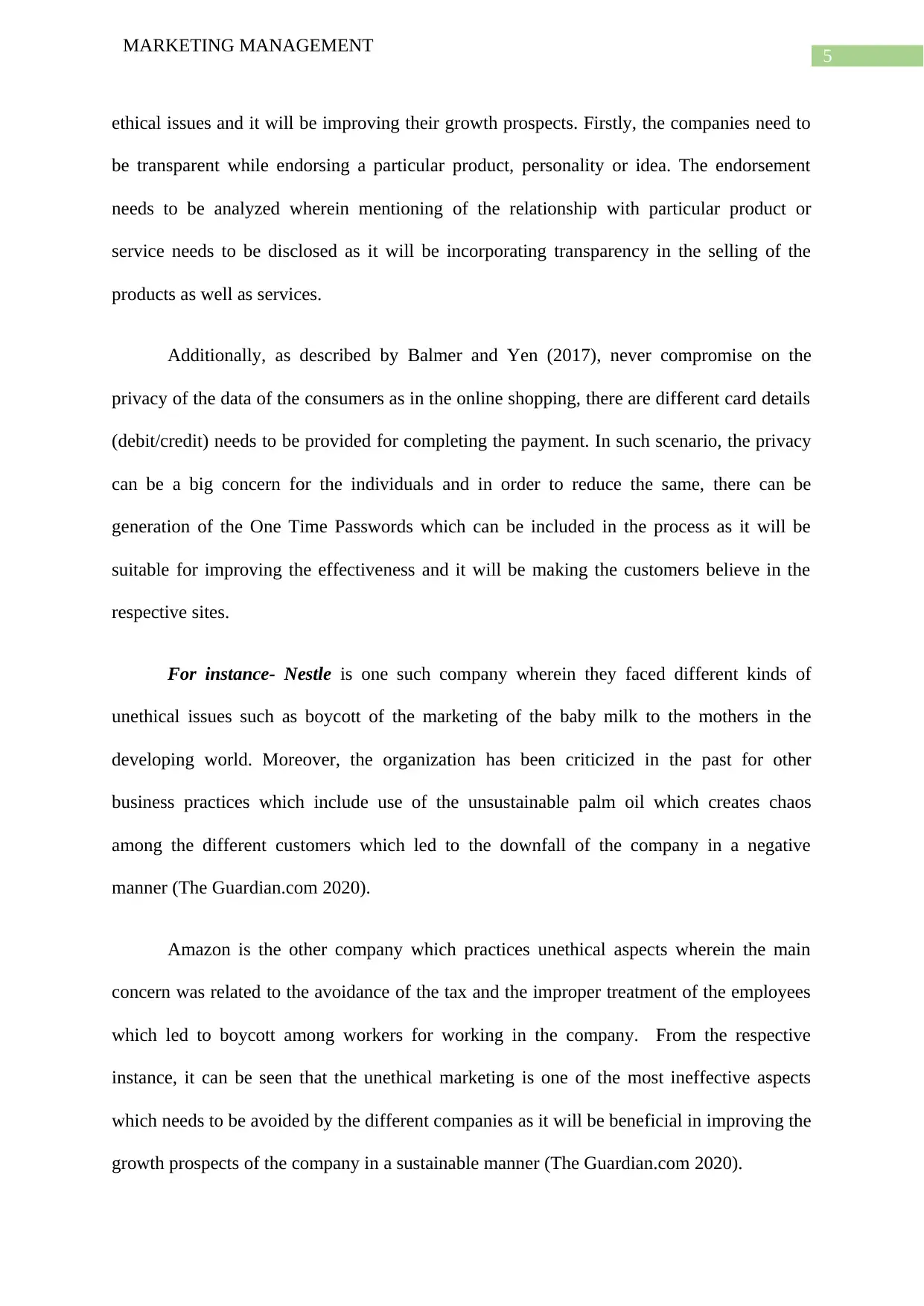
5
MARKETING MANAGEMENT
ethical issues and it will be improving their growth prospects. Firstly, the companies need to
be transparent while endorsing a particular product, personality or idea. The endorsement
needs to be analyzed wherein mentioning of the relationship with particular product or
service needs to be disclosed as it will be incorporating transparency in the selling of the
products as well as services.
Additionally, as described by Balmer and Yen (2017), never compromise on the
privacy of the data of the consumers as in the online shopping, there are different card details
(debit/credit) needs to be provided for completing the payment. In such scenario, the privacy
can be a big concern for the individuals and in order to reduce the same, there can be
generation of the One Time Passwords which can be included in the process as it will be
suitable for improving the effectiveness and it will be making the customers believe in the
respective sites.
For instance- Nestle is one such company wherein they faced different kinds of
unethical issues such as boycott of the marketing of the baby milk to the mothers in the
developing world. Moreover, the organization has been criticized in the past for other
business practices which include use of the unsustainable palm oil which creates chaos
among the different customers which led to the downfall of the company in a negative
manner (The Guardian.com 2020).
Amazon is the other company which practices unethical aspects wherein the main
concern was related to the avoidance of the tax and the improper treatment of the employees
which led to boycott among workers for working in the company. From the respective
instance, it can be seen that the unethical marketing is one of the most ineffective aspects
which needs to be avoided by the different companies as it will be beneficial in improving the
growth prospects of the company in a sustainable manner (The Guardian.com 2020).
MARKETING MANAGEMENT
ethical issues and it will be improving their growth prospects. Firstly, the companies need to
be transparent while endorsing a particular product, personality or idea. The endorsement
needs to be analyzed wherein mentioning of the relationship with particular product or
service needs to be disclosed as it will be incorporating transparency in the selling of the
products as well as services.
Additionally, as described by Balmer and Yen (2017), never compromise on the
privacy of the data of the consumers as in the online shopping, there are different card details
(debit/credit) needs to be provided for completing the payment. In such scenario, the privacy
can be a big concern for the individuals and in order to reduce the same, there can be
generation of the One Time Passwords which can be included in the process as it will be
suitable for improving the effectiveness and it will be making the customers believe in the
respective sites.
For instance- Nestle is one such company wherein they faced different kinds of
unethical issues such as boycott of the marketing of the baby milk to the mothers in the
developing world. Moreover, the organization has been criticized in the past for other
business practices which include use of the unsustainable palm oil which creates chaos
among the different customers which led to the downfall of the company in a negative
manner (The Guardian.com 2020).
Amazon is the other company which practices unethical aspects wherein the main
concern was related to the avoidance of the tax and the improper treatment of the employees
which led to boycott among workers for working in the company. From the respective
instance, it can be seen that the unethical marketing is one of the most ineffective aspects
which needs to be avoided by the different companies as it will be beneficial in improving the
growth prospects of the company in a sustainable manner (The Guardian.com 2020).
⊘ This is a preview!⊘
Do you want full access?
Subscribe today to unlock all pages.

Trusted by 1+ million students worldwide
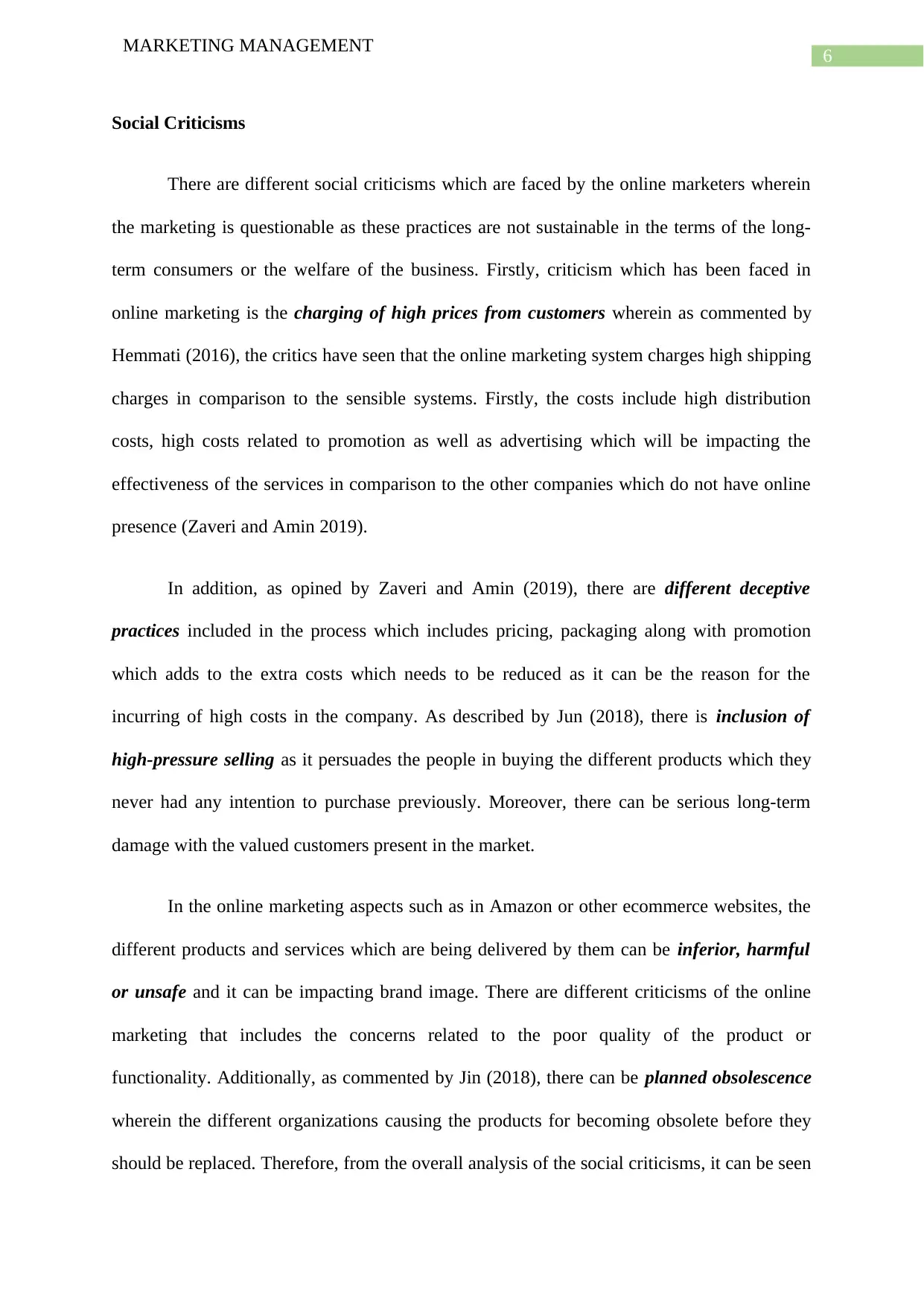
6
MARKETING MANAGEMENT
Social Criticisms
There are different social criticisms which are faced by the online marketers wherein
the marketing is questionable as these practices are not sustainable in the terms of the long-
term consumers or the welfare of the business. Firstly, criticism which has been faced in
online marketing is the charging of high prices from customers wherein as commented by
Hemmati (2016), the critics have seen that the online marketing system charges high shipping
charges in comparison to the sensible systems. Firstly, the costs include high distribution
costs, high costs related to promotion as well as advertising which will be impacting the
effectiveness of the services in comparison to the other companies which do not have online
presence (Zaveri and Amin 2019).
In addition, as opined by Zaveri and Amin (2019), there are different deceptive
practices included in the process which includes pricing, packaging along with promotion
which adds to the extra costs which needs to be reduced as it can be the reason for the
incurring of high costs in the company. As described by Jun (2018), there is inclusion of
high-pressure selling as it persuades the people in buying the different products which they
never had any intention to purchase previously. Moreover, there can be serious long-term
damage with the valued customers present in the market.
In the online marketing aspects such as in Amazon or other ecommerce websites, the
different products and services which are being delivered by them can be inferior, harmful
or unsafe and it can be impacting brand image. There are different criticisms of the online
marketing that includes the concerns related to the poor quality of the product or
functionality. Additionally, as commented by Jin (2018), there can be planned obsolescence
wherein the different organizations causing the products for becoming obsolete before they
should be replaced. Therefore, from the overall analysis of the social criticisms, it can be seen
MARKETING MANAGEMENT
Social Criticisms
There are different social criticisms which are faced by the online marketers wherein
the marketing is questionable as these practices are not sustainable in the terms of the long-
term consumers or the welfare of the business. Firstly, criticism which has been faced in
online marketing is the charging of high prices from customers wherein as commented by
Hemmati (2016), the critics have seen that the online marketing system charges high shipping
charges in comparison to the sensible systems. Firstly, the costs include high distribution
costs, high costs related to promotion as well as advertising which will be impacting the
effectiveness of the services in comparison to the other companies which do not have online
presence (Zaveri and Amin 2019).
In addition, as opined by Zaveri and Amin (2019), there are different deceptive
practices included in the process which includes pricing, packaging along with promotion
which adds to the extra costs which needs to be reduced as it can be the reason for the
incurring of high costs in the company. As described by Jun (2018), there is inclusion of
high-pressure selling as it persuades the people in buying the different products which they
never had any intention to purchase previously. Moreover, there can be serious long-term
damage with the valued customers present in the market.
In the online marketing aspects such as in Amazon or other ecommerce websites, the
different products and services which are being delivered by them can be inferior, harmful
or unsafe and it can be impacting brand image. There are different criticisms of the online
marketing that includes the concerns related to the poor quality of the product or
functionality. Additionally, as commented by Jin (2018), there can be planned obsolescence
wherein the different organizations causing the products for becoming obsolete before they
should be replaced. Therefore, from the overall analysis of the social criticisms, it can be seen
Paraphrase This Document
Need a fresh take? Get an instant paraphrase of this document with our AI Paraphraser
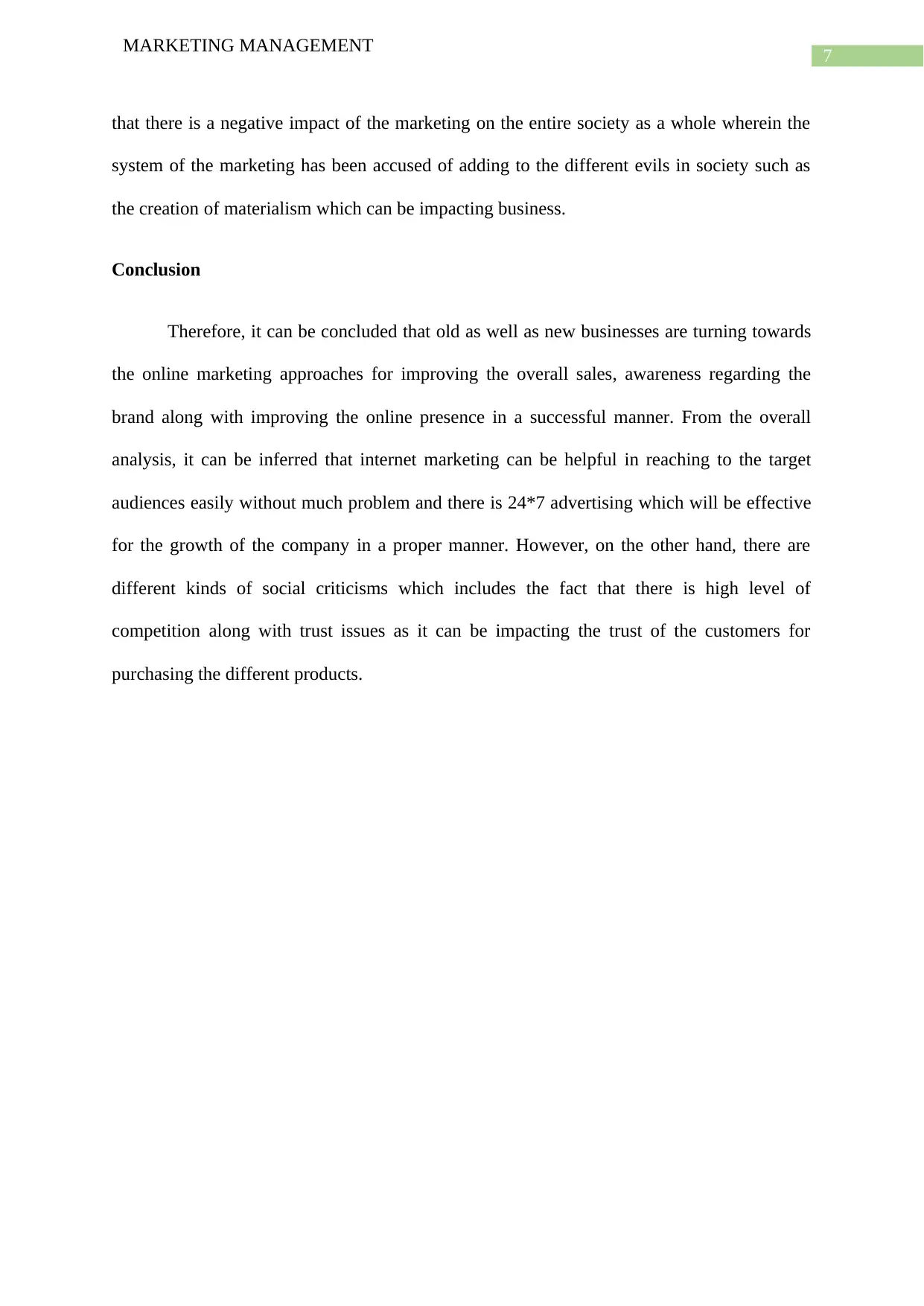
7
MARKETING MANAGEMENT
that there is a negative impact of the marketing on the entire society as a whole wherein the
system of the marketing has been accused of adding to the different evils in society such as
the creation of materialism which can be impacting business.
Conclusion
Therefore, it can be concluded that old as well as new businesses are turning towards
the online marketing approaches for improving the overall sales, awareness regarding the
brand along with improving the online presence in a successful manner. From the overall
analysis, it can be inferred that internet marketing can be helpful in reaching to the target
audiences easily without much problem and there is 24*7 advertising which will be effective
for the growth of the company in a proper manner. However, on the other hand, there are
different kinds of social criticisms which includes the fact that there is high level of
competition along with trust issues as it can be impacting the trust of the customers for
purchasing the different products.
MARKETING MANAGEMENT
that there is a negative impact of the marketing on the entire society as a whole wherein the
system of the marketing has been accused of adding to the different evils in society such as
the creation of materialism which can be impacting business.
Conclusion
Therefore, it can be concluded that old as well as new businesses are turning towards
the online marketing approaches for improving the overall sales, awareness regarding the
brand along with improving the online presence in a successful manner. From the overall
analysis, it can be inferred that internet marketing can be helpful in reaching to the target
audiences easily without much problem and there is 24*7 advertising which will be effective
for the growth of the company in a proper manner. However, on the other hand, there are
different kinds of social criticisms which includes the fact that there is high level of
competition along with trust issues as it can be impacting the trust of the customers for
purchasing the different products.
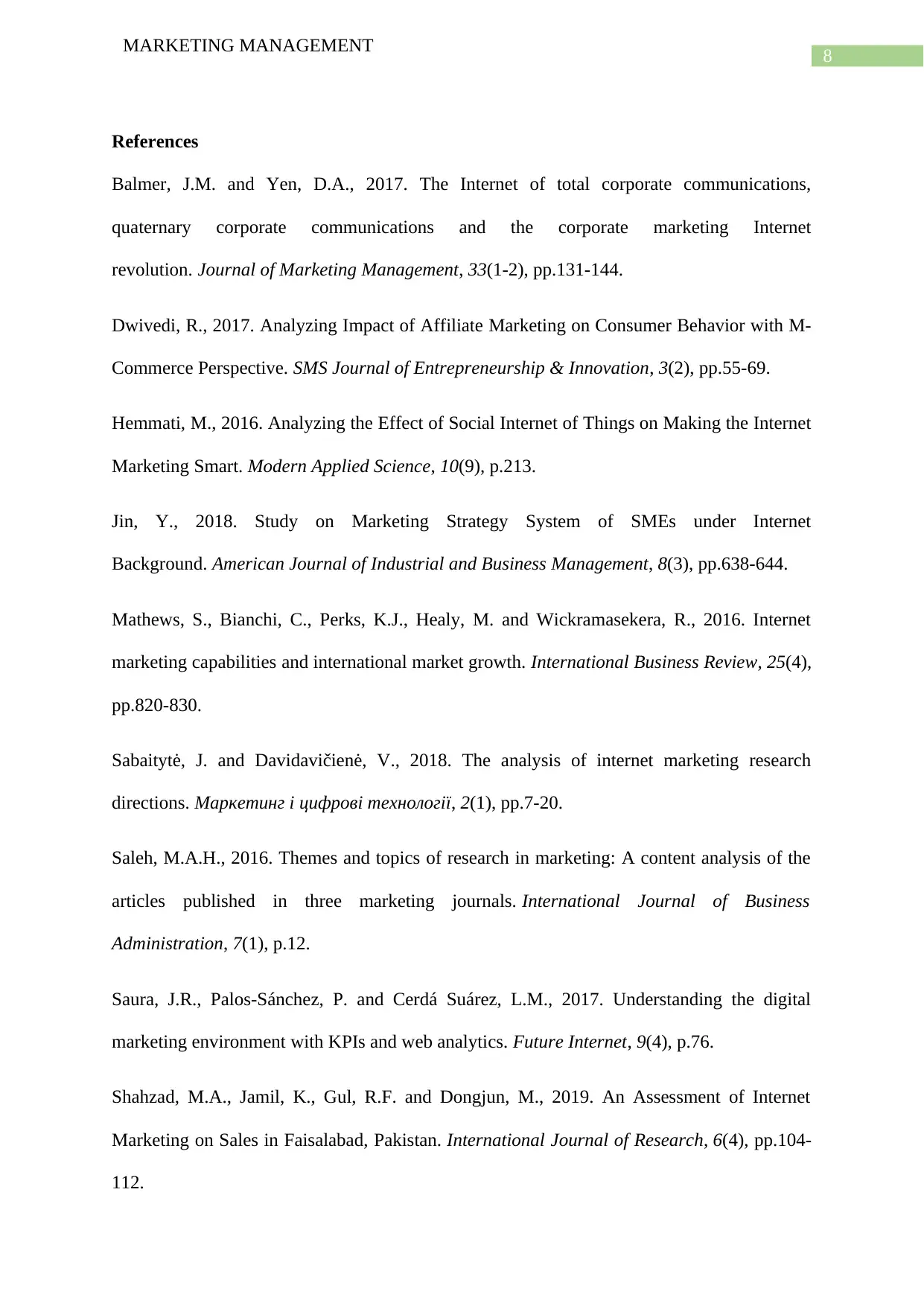
8
MARKETING MANAGEMENT
References
Balmer, J.M. and Yen, D.A., 2017. The Internet of total corporate communications,
quaternary corporate communications and the corporate marketing Internet
revolution. Journal of Marketing Management, 33(1-2), pp.131-144.
Dwivedi, R., 2017. Analyzing Impact of Affiliate Marketing on Consumer Behavior with M-
Commerce Perspective. SMS Journal of Entrepreneurship & Innovation, 3(2), pp.55-69.
Hemmati, M., 2016. Analyzing the Effect of Social Internet of Things on Making the Internet
Marketing Smart. Modern Applied Science, 10(9), p.213.
Jin, Y., 2018. Study on Marketing Strategy System of SMEs under Internet
Background. American Journal of Industrial and Business Management, 8(3), pp.638-644.
Mathews, S., Bianchi, C., Perks, K.J., Healy, M. and Wickramasekera, R., 2016. Internet
marketing capabilities and international market growth. International Business Review, 25(4),
pp.820-830.
Sabaitytė, J. and Davidavičienė, V., 2018. The analysis of internet marketing research
directions. Маркетинг і цифрові технології, 2(1), pp.7-20.
Saleh, M.A.H., 2016. Themes and topics of research in marketing: A content analysis of the
articles published in three marketing journals. International Journal of Business
Administration, 7(1), p.12.
Saura, J.R., Palos-Sánchez, P. and Cerdá Suárez, L.M., 2017. Understanding the digital
marketing environment with KPIs and web analytics. Future Internet, 9(4), p.76.
Shahzad, M.A., Jamil, K., Gul, R.F. and Dongjun, M., 2019. An Assessment of Internet
Marketing on Sales in Faisalabad, Pakistan. International Journal of Research, 6(4), pp.104-
112.
MARKETING MANAGEMENT
References
Balmer, J.M. and Yen, D.A., 2017. The Internet of total corporate communications,
quaternary corporate communications and the corporate marketing Internet
revolution. Journal of Marketing Management, 33(1-2), pp.131-144.
Dwivedi, R., 2017. Analyzing Impact of Affiliate Marketing on Consumer Behavior with M-
Commerce Perspective. SMS Journal of Entrepreneurship & Innovation, 3(2), pp.55-69.
Hemmati, M., 2016. Analyzing the Effect of Social Internet of Things on Making the Internet
Marketing Smart. Modern Applied Science, 10(9), p.213.
Jin, Y., 2018. Study on Marketing Strategy System of SMEs under Internet
Background. American Journal of Industrial and Business Management, 8(3), pp.638-644.
Mathews, S., Bianchi, C., Perks, K.J., Healy, M. and Wickramasekera, R., 2016. Internet
marketing capabilities and international market growth. International Business Review, 25(4),
pp.820-830.
Sabaitytė, J. and Davidavičienė, V., 2018. The analysis of internet marketing research
directions. Маркетинг і цифрові технології, 2(1), pp.7-20.
Saleh, M.A.H., 2016. Themes and topics of research in marketing: A content analysis of the
articles published in three marketing journals. International Journal of Business
Administration, 7(1), p.12.
Saura, J.R., Palos-Sánchez, P. and Cerdá Suárez, L.M., 2017. Understanding the digital
marketing environment with KPIs and web analytics. Future Internet, 9(4), p.76.
Shahzad, M.A., Jamil, K., Gul, R.F. and Dongjun, M., 2019. An Assessment of Internet
Marketing on Sales in Faisalabad, Pakistan. International Journal of Research, 6(4), pp.104-
112.
⊘ This is a preview!⊘
Do you want full access?
Subscribe today to unlock all pages.

Trusted by 1+ million students worldwide
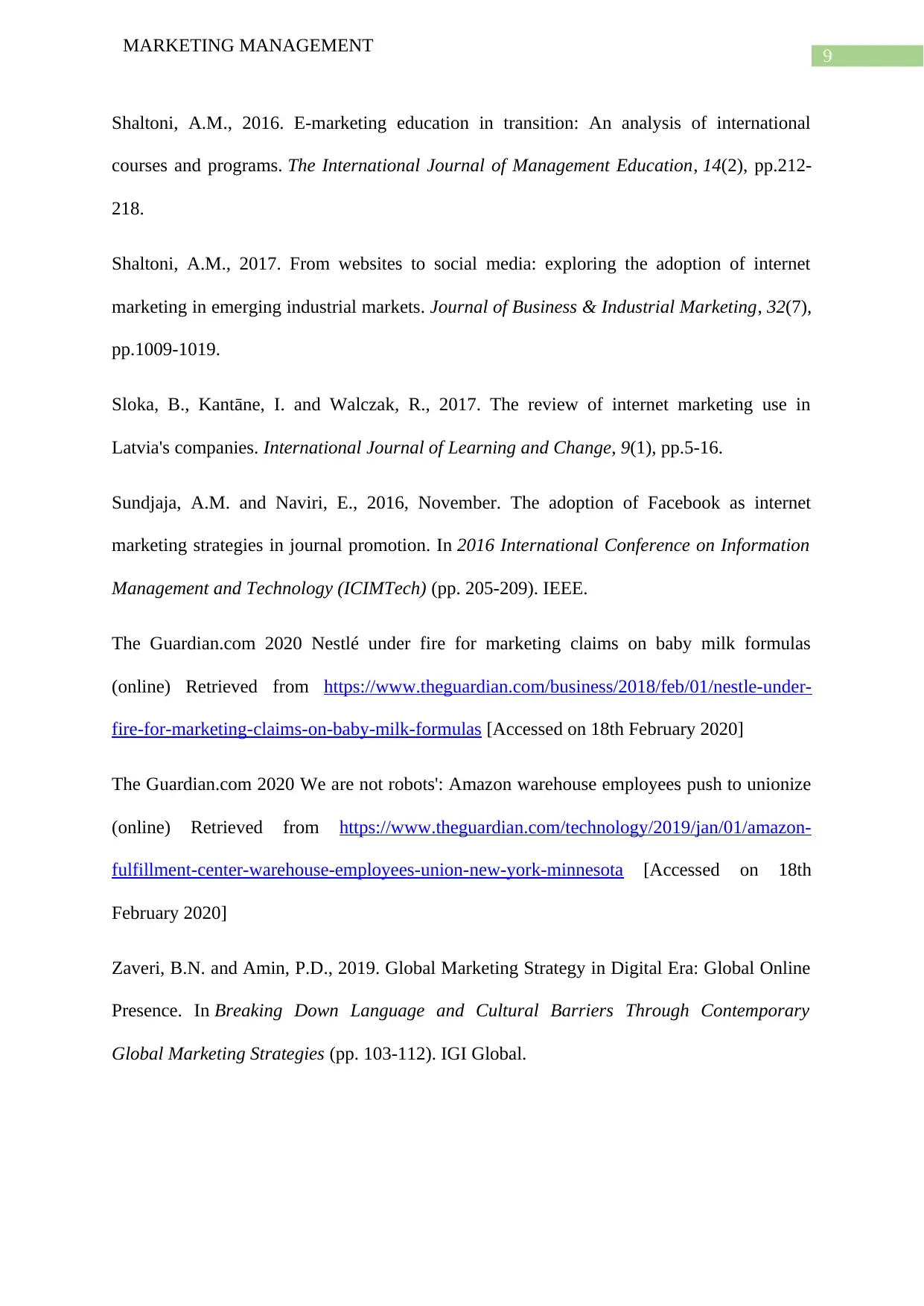
9
MARKETING MANAGEMENT
Shaltoni, A.M., 2016. E-marketing education in transition: An analysis of international
courses and programs. The International Journal of Management Education, 14(2), pp.212-
218.
Shaltoni, A.M., 2017. From websites to social media: exploring the adoption of internet
marketing in emerging industrial markets. Journal of Business & Industrial Marketing, 32(7),
pp.1009-1019.
Sloka, B., Kantāne, I. and Walczak, R., 2017. The review of internet marketing use in
Latvia's companies. International Journal of Learning and Change, 9(1), pp.5-16.
Sundjaja, A.M. and Naviri, E., 2016, November. The adoption of Facebook as internet
marketing strategies in journal promotion. In 2016 International Conference on Information
Management and Technology (ICIMTech) (pp. 205-209). IEEE.
The Guardian.com 2020 Nestlé under fire for marketing claims on baby milk formulas
(online) Retrieved from https://www.theguardian.com/business/2018/feb/01/nestle-under-
fire-for-marketing-claims-on-baby-milk-formulas [Accessed on 18th February 2020]
The Guardian.com 2020 We are not robots': Amazon warehouse employees push to unionize
(online) Retrieved from https://www.theguardian.com/technology/2019/jan/01/amazon-
fulfillment-center-warehouse-employees-union-new-york-minnesota [Accessed on 18th
February 2020]
Zaveri, B.N. and Amin, P.D., 2019. Global Marketing Strategy in Digital Era: Global Online
Presence. In Breaking Down Language and Cultural Barriers Through Contemporary
Global Marketing Strategies (pp. 103-112). IGI Global.
MARKETING MANAGEMENT
Shaltoni, A.M., 2016. E-marketing education in transition: An analysis of international
courses and programs. The International Journal of Management Education, 14(2), pp.212-
218.
Shaltoni, A.M., 2017. From websites to social media: exploring the adoption of internet
marketing in emerging industrial markets. Journal of Business & Industrial Marketing, 32(7),
pp.1009-1019.
Sloka, B., Kantāne, I. and Walczak, R., 2017. The review of internet marketing use in
Latvia's companies. International Journal of Learning and Change, 9(1), pp.5-16.
Sundjaja, A.M. and Naviri, E., 2016, November. The adoption of Facebook as internet
marketing strategies in journal promotion. In 2016 International Conference on Information
Management and Technology (ICIMTech) (pp. 205-209). IEEE.
The Guardian.com 2020 Nestlé under fire for marketing claims on baby milk formulas
(online) Retrieved from https://www.theguardian.com/business/2018/feb/01/nestle-under-
fire-for-marketing-claims-on-baby-milk-formulas [Accessed on 18th February 2020]
The Guardian.com 2020 We are not robots': Amazon warehouse employees push to unionize
(online) Retrieved from https://www.theguardian.com/technology/2019/jan/01/amazon-
fulfillment-center-warehouse-employees-union-new-york-minnesota [Accessed on 18th
February 2020]
Zaveri, B.N. and Amin, P.D., 2019. Global Marketing Strategy in Digital Era: Global Online
Presence. In Breaking Down Language and Cultural Barriers Through Contemporary
Global Marketing Strategies (pp. 103-112). IGI Global.
1 out of 10
Related Documents
Your All-in-One AI-Powered Toolkit for Academic Success.
+13062052269
info@desklib.com
Available 24*7 on WhatsApp / Email
![[object Object]](/_next/static/media/star-bottom.7253800d.svg)
Unlock your academic potential
Copyright © 2020–2026 A2Z Services. All Rights Reserved. Developed and managed by ZUCOL.





